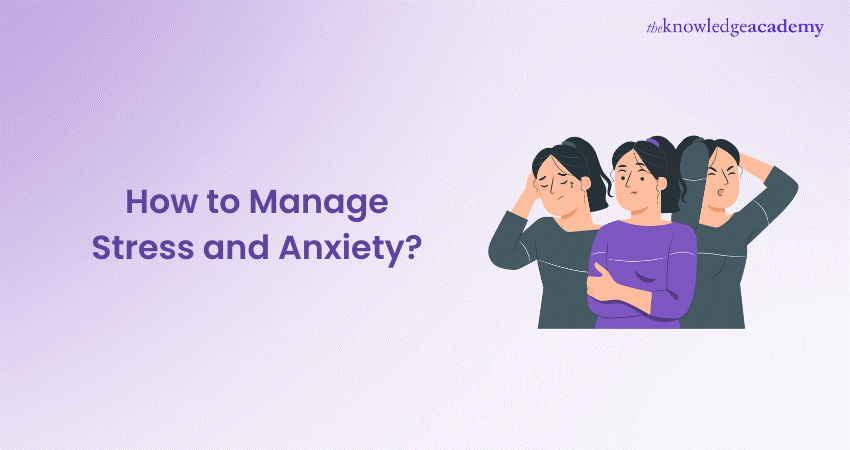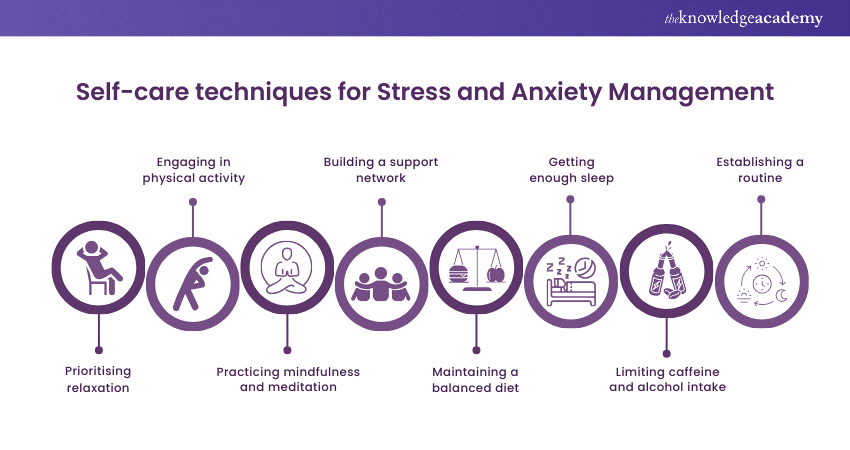We may not have the course you’re looking for. If you enquire or give us a call on 44 1344 203 999 and speak to our training experts, we may still be able to help with your training requirements.
Training Outcomes Within Your Budget!
We ensure quality, budget-alignment, and timely delivery by our expert instructors.

Many people experience stress and anxiety in today’s hectic and competitive world. The pressure from work, family, and personal matters can sometimes be too much to handle, affecting our health and happiness. Therefore, it is important to learn How to Manage Stress and Anxiety in a healthy and effective way.
According to a Lancet Report, people with Stress, Anxiety or Depression have a 40% higher risk of developing cardiovascular and metabolic diseases than the general population. However, by understanding strategies to overcome Stress and Anxiety, you can cope with them in a healthy way.This blog will provide you with insights on How to manage Stress and Anxiety.
Table of Contents
1) Understanding Stress and Anxiety
2) Self-care techniques for Stress and Anxiety Management
3) Maintaining long-term Stress and Anxiety Management
4) Conclusion
Understanding Stress and Anxiety
Stress and Anxiety are related psychological states that can affect our well-being in negative ways. To cope with them better, we need to understand what they are, what causes them, and how they impact us. In this section, we will explore these aspects of Stress and Anxiety in more detail.
Stress is the body’s way of reacting to any challenge, whether physical, mental, or emotional. It helps us to deal with potential dangers or difficulties. However, too much Stress for too long can harm our mental and physical health.
Anxiety is a feeling of worry, fear, or nervousness. Unlike Stress, which is usually linked to a specific situation or problem, Anxiety can last even when there is no obvious threat. Anxiety can make us feel constantly uneasy, restless, and scared.
There are many possible sources of Stress and Anxiety for different people. Some common ones are work-related issues, such as deadlines, workload, or conflicts. Others are social or personal challenges, such as moving, starting a new job, or facing a major change.
Stress and Anxiety can show up in different ways, affecting both our body and mind. Some physical signs are fast heartbeat, chest pain, muscle stiffness, headaches, stomach problems, and sleep problems. Some mental and emotional signs are anger, difficulty focusing, racing thoughts, excessive worry, and feeling overwhelmed. Luckily, there are effective ways to manage Stress and Anxiety with the right strategies.
Self-care techniques for Stress and Anxiety Management
Stress and Anxiety affect our well-being. Self-care helps us take care of our health and reduce their impact. In this section, we will explore self-care methods to manage Stress and Anxiety better.

1) Prioritising relaxation: Engaging in activities that promote relaxation is crucial for reducing Stress and Anxiety levels. This can include practices such as deep breathing exercises, progressive muscle relaxation, taking warm baths, or indulging in hobbies that bring joy and peace.
2) Engaging in physical activity: Exercise can help you cope with Stress and Anxiety. When you do activities like walking, jogging, yoga, or dancing, your body makes endorphins, which are chemicals that make you feel good and reduce Stress and Anxiety.
3) Practising mindfulness and meditation: Mindfulness and meditation are powerful tools for managing Stress and Anxiety. By focusing on the present moment and cultivating awareness without judgment, individuals can reduce racing thoughts, increase calmness, and develop a greater sense of overall well-being.
4) Building a support network: Having a support network of trusted friends, family, or support groups is invaluable for Stress and Anxiety Management. Sharing concerns, seeking advice, or simply having someone to listen can provide emotional support and alleviate feelings of isolation.
5) Maintaining a balanced diet: Proper nutrition plays a significant role in managing Stress and Anxiety. Consuming a diet full of fruits, vegetables, whole grains, and lean proteins provides the body with essential nutrients and helps regulate mood and energy levels.
6) Getting enough sleep: Sleep deprivation can significantly impact Stress and Anxiety levels. Prioritising adequate sleep by practising good sleep hygiene, such as establishing a bedtime routine and creating a comfortable sleep environment, promotes restfulness and rejuvenation.
7) Limiting caffeine and alcohol intake: Excessive consumption of caffeine and alcohol can exacerbate Stress and Anxiety symptoms. It is advisable to limit or avoid these substances, as they can disrupt sleep patterns, increase heart rate, and trigger feelings of restlessness or agitation.
8) Establishing a routine: Establishing a structured daily routine provides a sense of stability and control, which can help manage Stress and Anxiety. Setting realistic goals, organising tasks, and prioritising self-care activities within the routine can contribute to a more balanced and fulfilling life.
Want to build Resilience and master Stress Management techniques to thrive in challenging times? Join our Handle Stress and Develop Your Resilience Course today!
Maintaining long-term Stress and Anxiety Management
Stress and Anxiety affect our well-being. We need to know what they are, what causes them, and how they impact us. In this section, we will explore self-care methods to manage Stress and Anxiety better:
1) Consistency in self-care practises: Consistency is key when it comes to self-care practises. It is important to prioritise and allocate time for self-care activities regularly. Whether it is engaging in relaxation exercises, practising mindfulness, or participating in physical activities, making them a consistent part of our routine allows us to reap their benefits consistently.
2) Regular check-ins: Regularly checking in with ourselves is vital for long-term Stress and Anxiety Management. Taking time to reflect on our emotions, Stress levels, and overall well-being enables us to identify triggers, make adjustments, and seek support when needed. Self-reflection promotes self-awareness and empowers us to make informed choices to maintain our mental and emotional health.
3) Adaptability and flexibility: Life is full of changes and challenges, and it is essential to adapt our Stress and Anxiety Management strategies accordingly. Being open to adjusting our self-care practises, seeking new coping mechanisms, and embracing change foster resilience and ensures that our approaches remain effective over time. Flexibility allows us to navigate different circumstances while maintaining our well-being.
4) Holistic approach: Taking a holistic approach to Stress and Anxiety Management involves addressing multiple aspects of our lives. This includes one’s physical, mental, emotional, and spiritual well-being. Balancing work, relationships, hobbies, self-care, and personal growth ensures that we nurture ourselves comprehensively and create a solid foundation for long-term Stress and Anxiety Management.
5) Continuous learning and growth: Being open to learning and personal growth is essential for maintaining long-term Stress and Anxiety Management. Keeping up with research, exploring new coping techniques, attending workshops or therapy sessions, and seeking knowledge about Stress and Anxiety Management can enhance our understanding and equip us with new tools to navigate challenges effectively.
Take control of your Stress levels and enhance your well-being with our comprehensive Stress Management Course. Sign up now!
Conclusion
In conclusion, managing Stress and Anxiety is essential for our overall well-being. By prioritising self-care, engaging in relaxation techniques, seeking support, and maintaining a holistic approach, we can effectively navigate the challenges of Stress and Anxiety. One must remember that though it is a journey that requires consistency and perseverance, the rewards are surely worth it. Hope this blog gave you valuable knowledge on How to Manage Stress and Anxiety!
Want to unlock your full potential and embark on a journey of personal growth? Sign up for our transformative Personal Development Courses Today!
Frequently Asked Questions

Stress and Anxiety can affect employees’ physical and mental health, as well as their performance, productivity, and relationships at work. Proactively managing stress and Anxiety can help employees cope better, prevent burnout, and improve their well-being and job satisfaction.

A supportive workplace culture fosters open communication, flexibility, feedback, and respect among employees and managers. A supportive workplace culture can enhance employees’ mental well-being by reducing stress, increasing engagement, and creating a positive and safe work environment.

The Knowledge Academy takes global learning to new heights, offering over 30,000 online courses across 490+ locations in 220 countries. This expansive reach ensures accessibility and convenience for learners worldwide.
Alongside our diverse Online Course Catalogue, encompassing 17 major categories, we go the extra mile by providing a plethora of free educational Online Resources like News updates, Blogs, videos, webinars, and interview questions. Tailoring learning experiences further, professionals can maximise value with customisable Course Bundles of TKA.

The Knowledge Academy’s Knowledge Pass, a prepaid voucher, adds another layer of flexibility, allowing course bookings over a 12-month period. Join us on a journey where education knows no bounds.

The Knowledge Academy offers various Personal Development courses, including Stress Management, Time Management and Attention Management Training. These courses cater to different skill levels, providing comprehensive insights into Stress Management.
Our Business Skills blogs covers a range of topics related to Stress Management, offering valuable resources, best practices, and industry insights. Whether you are a beginner or looking to advance your Business skills, The Knowledge Academy's diverse courses and informative blogs have you covered.
Upcoming Business Skills Resources Batches & Dates
Date
 Handle Stress and Develop Your Resilience
Handle Stress and Develop Your Resilience
Fri 24th Jan 2025
Fri 21st Mar 2025
Fri 2nd May 2025
Fri 27th Jun 2025
Fri 29th Aug 2025
Fri 3rd Oct 2025
Fri 5th Dec 2025







 Top Rated Course
Top Rated Course



 If you wish to make any changes to your course, please
If you wish to make any changes to your course, please


